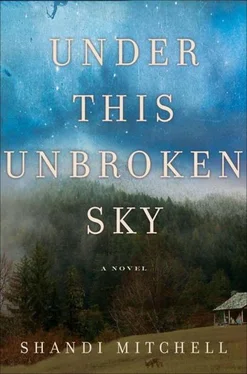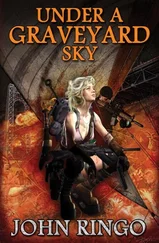Maria stokes the fire. A large pot of water boils.
OUTSIDE, TEODOR IS OBLIVIOUS TO THE MOSQUITOES swarming his head. He exhales another long draw of smoke. He has forgotten to ask what day it is. Six hundred days and nights reduced to scratches on a wall. Four hundred and eighty thousand steps paced in an eight-foot by eight-foot cell. Five steps—wall, five steps—wall. One hundred and fifty steps shuffled down the corridor past the closed cell doors. Eyes to the floor. Eyes to the floor. The only sound the click of the guard’s boots and the chattering of leg irons.
Shiny Boots’s trouser cuffs were frayed at the back. The heels of his boots were rounded, more on the left than the right. Shiny Boots preferred the strap over the lash. He’d spread his feet apart for better stability. He had small feet. Teodor had to shorten his step not to overtake him and breach the mandatory six-foot distance.
Ten steps down the stone stairs. Eighty-five steps across the dirt yard to the iron gate groaning open. Six steps to the outside world. How many days ago was that? One hundred and eighty-six thousand steps. He takes another puff on the cigarette.
“I’m still here,” his voice rasps.
He hasn’t seen his sister, Anna, yet. She hasn’t come out, even though she’s just eight inches away on the other side of the log wall. Teodor saw her watching him as he followed Maria to the shack. At least, he saw the torn slip that serves as her curtain fall back into place. Now he can see light through the chinks, obscured intermittently by movement inside. Maybe it’s her children. Maybe it’s her. She’ll come to him in her own time. Teodor knows that she’s ashamed of him, but he can forgive her that. She took his family in. He owes her his life.
It was my grain. The words roll dull and hollow in his head, worn from the constant repetition. Come to the land of wheat. A hundred and sixty acres. Ten dollars is all it will cost. Come, they said. Thirteen days in the steerage of a ship crouched in vomit, piss, and shit with his wife and four children. Come.
A year renting the land, waiting for a homestead entry. Working as a field hand in exchange for the loan of an ax, a saw, a team of horses, and a plow. He signed a contract he couldn’t read. They said everything will be fine. You have three years to pay it back. Build a farm, clear the fields, dig a well, plant the seed. Learn English. The second year, lose the crop to hail. They give him more seed, add one dollar to the contract, shake his hand, and call him Ted.
Three weeks before harvest, they come for their money. Eleven dollars. They take it all—the house, the barn, the shed, the lumber, the fields ripe with grain—and say, “Leave.” It was August. The grain in those fields was worth sixty, seventy dollars.
He took one wagonload of seed. From his field, his sweat, his pay. One wagonload to start again. And they arrest him. It was my grain.
The words collapse into dust. He swallows. His tongue licks at parched lips.
Above, a wash of northern lights pulse green and white across the prairie sky. Below, a chorus of frogs croaks. Their song swells across the fields, reverberates in Teodor’s chest. Teodor listens, eyes almost shut. He leans against the shack, his smoke burning low between his fingers. He breathes in the space between him and the sky.
The frogs fall silent. The night has paused. Teodor is aware that he is holding his breath. He looks instinctively to the paddock. The scrawny cow chews compulsively on a fence pole, oblivious to the unsettling quiet. Teodor leans forward slightly, rooting his feet to the ground, ears straining, eyes squinting to penetrate the darkness. His muscles coiled, ready to fight or flee. Cautiously, a lone bullfrog picks up his refrain and soon a bevy of females answer.
Teodor breathes deep and flicks his smoke into the night. Spring has arrived swollen and impregnated by the retreating frost. He can smell her sweet decay. He can almost hear the earth heaving and groaning beneath his feet, opening herself wide to push her seedlings into light.
Teodor crouches down and places his hand against the cool ground. For a moment, he thinks he can feel her heart beating, but realizes it is his own pulse. This surprises him, because it means he is still alive. A movement catches his eye.
His sister’s side of the cabin is shrouded in darkness. The oil lamps have been blown out. And then Teodor sees Anna standing at the window, a few feet to the left of him. She doesn’t see him crouched in the shadows.
She is pale. Her face has lost its roundness. Her flesh clings to her bones. Dark circles heighten the sunken appearance of her eyes. Her hair, which she used to wear in braids coiled on either side, snaked with ribbons, is shorn and matted. She looks much older than the one year that separates them. Teodor remembers her eyes being icy blue. In the old country, boys had written poems about her eyes.
Anna stares straight ahead. Teodor wonders if she is looking for her useless husband. He hasn’t seen Stefan since his arrival. But there is something about the closeness of her gaze that convinces him that she isn’t looking into the night, or to the paddock, or at the sky. She is staring into her own reflection. Into her own eyes. Teodor wants to stand up and tell her that he is here. But Anna steps away from the window and disappears into the blackness.
MARIA EMPTIES ANOTHER POT OF STEAMING WATER INTO the metal tub that serves as both bath and scalding tub for butchering chickens. She has no soap, no towels. She tears another strip of cloth from the remnants of a white linen skirt. Elaborate embroidery still adorns the hem.
She wore this skirt under her everyday skirt the night they escaped. The soldiers didn’t take clothes. They took horses, cows, weapons, tools, even the shovels. They tore down holy icons and nailed up posters of Stalin. They took the land and the grain and said, You own nothing. Those who refused to meet the harvest quotas were marched to open pits and shot. After that, the quotas were met. The penalty for concealing even a handful of wheat was death. A bounty was offered. Houses and barns were searched and the fields stripped until there was no more grain. Every day she had prayed to the Virgin Mother for Teodor not to fight back. To stay alive.
The soldiers would come, usually four at a time: two on horseback, two in the cart. They had a gramophone that they hand-cranked and Stalin’s voice boomed the praises of collectivism. Then they would go door to door until the cart bulged with sacks of wheat. They carried pistols, but the starving don’t fight back. Theirs was always the last house searched. Teodor had an arrangement with the soldiers, who had learned long ago that he made the best homebrew.
He was allowed to keep a pound of wheat, but if the liquor’s quality ever degraded or the quantity diminished, the arrangement would be terminated. Maria hated Teodor for robbing her babies of even the smallest morsel of food. The soldiers would go through the motions of throwing their few belongings out the door and driving pitchforks into the thatched roof for contraband, while Teodor disappeared into the night and returned with half a jar of amber liquid.
But that night, he came back with a whole jug. They almost shot him on the spot, accused him of withholding grain. He assured them he had saved it up to make this batch. A gift for them. A token of respect for their difficult jobs. The liquid was clearer. He assured them it was purer. They were suspicious. Teodor had to drink first to prove that it wasn’t poison. After that, they relaxed. The first drink made them feel like men, the second reminded them that they were powerful, and the fifth made them stupid.
Maria sat on the edge of the bed. Dania, Myron, Sofia, not yet five, and Katya, barely six months old, clung to her in their sleep. She could feel their bony arms; the swell of their bellies. She played over and over in her head what she would pack. And she prayed. She prayed for a miracle. They had to leave. She would not choose which child would eat and which one would die. They should have got out with Anna and Stefan, before Stalin, before it all happened. But then they still had hope. By the eighth drink, the men were unconscious.
Читать дальше












